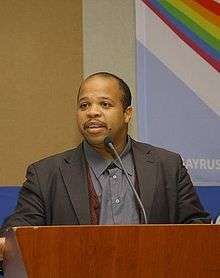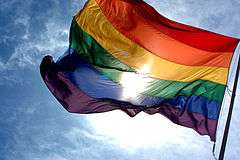International Day Against Homophobia, Transphobia and Biphobia
| International Day Against Homophobia Biphobia Transphobia | |
|---|---|
 | |
| Date | May 17 |
| Next time | 17 May 2017 |
| Frequency | annual |
The International Day Against Homophobia, Transphobia and Biphobia[1][2][3] is observed on May 17 and aims to coordinate international events that raise awareness of LGBT rights violations and stimulate interest in LGBT rights work worldwide. In the 9th edition, in 2013, commemorations took place in almost 120 countries, in all world regions.[4]
The founders of the International Day Against Homophobia, as it was originally known, established the IDAHO Committee to coordinate grass-roots actions in different countries, to promote the day and to lobby for official recognition on May 17. That date was chosen to commemorate the decision to remove homosexuality from the International Classification of Diseases of the World Health Organization (WHO) in 1990.[5]
History

The day was conceived in 2004. A year-long campaign culminated in the first International Day Against Homophobia on May 17, 2005. 24,000 individuals as well as organizations such as the International Lesbian and Gay Association (ILGA), the International Gay and Lesbian Human Rights Commission (IGLHRC), the World Congress of LGBT Jews, and the Coalition of African Lesbians signed an appeal to support the "IDAHO initiative". Activities for the day took place in many countries, including the first LGBT events ever to take place in the Congo, China, and Bulgaria.
In 2009, transphobia was added to the name of the campaign, and activities that year focused primarily on transphobia (violence and discrimination against transgender people). A new petition was launched in cooperation with LGBT organizations in 2009, and it was supported by more than 300 NGOs from 75 countries, as well as three Nobel Prize winners (Elfriede Jelinek, Françoise Barré-Sinoussi, and Luc Montagnier). On the eve of May 17, 2009, France became the first country in the world to officially remove transgender issues from its list of mental illnesses.[7][8]
Frenchman Louis-Georges Tin was founder of the day, and acted as its Committee Chairperson until his resignation in September 2013. He was succeeded by internationally renowned Venezuelan trans rights activist, lawyer and law professor Tamara Adrián, who became one of the first trans legislators in Latin America in 2015.
Louis-Georges Tin and two other Committee members started a hunger-strike on June 2012 to urge the French president Hollande to introduce a UN resolution decriminalising homosexuality.[9]
In France, same-sex marriage has been legal since 18 May 2013; a decision announced on May 17.[10]
Biphobia was added to the name of the campaign in 2015.[11]
Goals and activities
The main purpose of the May 17 mobilisations is to raise awareness of violence, discrimination, and repression of LGBT communities worldwide, which in turn provides an opportunity to take action and engage in dialogue with the media, policymakers, public opinion, and wider civil society.
One of the stated goals of May 17 is to create an event that can be visible at a global level without needing to conform to a specific type of action.[12] This decentralized approach is needed due to the diversity of social, religious, cultural, and political contexts in which rights violations occur.
May 17 around the world

The day is particularly strong in Europe and Latin America, where it is commemorated with public events in almost all countries.[13] May 17 is also marked in multiple countries in all world regions including, in 2013, 32 of the 76 countries in the world[14] where same-sex relationships are criminalised.[13]
Common actions include large-scale street marches, parades and festivals. In Cuba, for example, Mariela Castro has led out a huge street parade in honor of May 17 for the past 3 years. In Chile in 2013, 50,000 people took to the streets to mark May 17, and the VIII Santiago Equality march.[15]
Arts and culture-based events are also common. For example, Bangladeshi activists organised the music festival "Love Music Hate Homophobia" in 2013.[16] Albanian LGBT activists have, in 2012 and 2013 been organising an annual Bike (P) Ride for May 17 through the streets of the capital Tirana.[17] In 2013, the day's Committee called for international actions for a Global Rainbow Flashmob[18] to mark May 17. Activists in 100 cities, in 50 countries participated with diverse public events spanning coloured balloon releases, dance flashmobs, musical events, and performance and street art.[19]
Official recognition
In 2003 the Canadian organization Fondation Émergence instituted a similar event, the National Day Against Homophobia, which was held on June 1. In 2006, they changed the date to May 17, in order to join the international movement.[20]
In 2006, The Declaration of Montreal was created and adopted by the 2006 World Outgames. The Declaration demanded that the United Nations and all states recognize May 17 as the International Day Against Homophobia.
In 2007, in Aosta Valley (Italy), the government approved the support for the IDAHOT[21]
In 2010, Lula, then president of Brazil, signed an act that instituted May 17 as the National Day Against Homophobia in his country.[22][23]
The day is also officially recognized by the EU Parliament, Spain, Portugal, Belgium, the UK, Mexico, Costa Rica, Croatia, the Netherlands, France, Luxembourg and Venezuela. It is also recognized by numerous local authorities, such as the province of Quebec or the city of Buenos Aires.[24]
In 2012, the city of Liverpool, England created a pioneering programme of events in association with the organisation Homotopia, called IDAHO 50. The event was supported by 50 leading organisations based in Liverpool.[25][26][27]"Link" (PDF).
On March 21, 2014, Mexico declared, by Presidential Decree, May 17 as the National Day Against Homophobia.[28] See LGBT rights in Mexico.
Venezuela's National Assembly (AN) officially recognized May 17 as the Day against Homophobia, Transphobia and Biphobia on May 12 2016.[29] AN Deputy Tamara Adrian, also international Chairwoman of the IDAHO Committee, hailed the legislative act as a "sign of change" in a Venezuela where "everyone has equal rights and opportunities".[30]
In several other countries (e.g. Argentina, Bolivia, Australia, and Croatia) national civil society coalitions have called upon their authorities to have May 17 officially recognized.
Impact
As of 2012, few countries have passed legislation at the federal level that includes full-fledged legal recognition for LGBT couples such as marriage, adoption, inheritance, and insurance rights, despite the efforts of the May 17 movement. Some countries continue to criminalize homosexuality or transgender identity and persecute LGBT people, sometimes violently. LGBT people in these countries may be vulnerable to state violence or hate crimes, and LGBT organizations or movements may be vulnerable to state-sponsored harassment.
An ILGA report issued for the day in 2009 confirmed that 76 countries still consider same-sex relationships illegal. In seven of these countries, same-sex sexual acts are punishable by death. In almost all countries, transphobic laws limit the freedom to act in ways that do not conform to the roles and expectations that are culturally determined by a person's sex assigned at birth.
See also
- Biphobia
- Heterosexism
- Homophobia
- LGBT rights by country or territory
- LGBT social movements
- National Day Against Homophobia (Canada)
- National Coming Out Day
- Transgender Day of Remembrance
- Transphobia
- Declaration of Montreal
References
- ↑ "International Day Against Homophobia, Transphobia and Biphobia". IDAHO Committee. Retrieved 9 October 2013.
- ↑ "All Events, United Nations Educational, Scientific and Cultural Organization". UNESCO. Retrieved 9 October 2013.
- ↑ . ILGA http://ilga.org/ilga/en/article/o5a7LLP17y. Retrieved 9 October 2013. Missing or empty
|title=(help) - ↑ . IDAHO Committee http://dayagainsthomophobia.org/reports. Missing or empty
|title=(help) - ↑ "May 17th is the Intl Day Against Homophobia". Ilga.org. Retrieved 2013-12-03.
- ↑ "International Day Against Homophobia and Transphobia". United States Embassy of London. Retrieved 2015-11-01.
- ↑
- ↑
- ↑ IDAHO founder begins hunger strike for UN resolution on decriminalising homosexuality retrieved 29 June 2012
- ↑ "Hollande Signs French Gay Marriage Law". The New York Times. 19 May 2013.
- ↑ "IDAHOT | Metropolitan Community Churches". Mccchurch.org. Retrieved 2015-05-15.
- ↑ "MAY 17 2013 IN AUSTRALIA – EVENTS LISTINGS". IDAHO Committee. Retrieved 9 October 2013.
- 1 2 Annual Report 2013. IDAHO Committee http://dayagainsthomophobia.org/reports/. Retrieved 9 October 2013. Missing or empty
|title=(help) - ↑ "2010 Report on State Sponsored Homophobia Throughout the World". ILGA. Retrieved 9 October 2013.
- ↑ "More than 50,000 attend Chilean LGBT rights march". Washington Blade. Retrieved 9 October 2013.
- ↑ "Bangladesh IDAHO Report 2013". IDAHO Committee. Retrieved 9 October 2013.
- ↑ "An Unofficial View of Tirana". Continent Blog. Retrieved 9 October 2013.
- ↑ "Homepage". Global Rainbow Flashmob - Official Site. Retrieved 9 October 2013.
- ↑ "2013 Annual Report". IDAHO Committee. Retrieved 9 October 2013.
- ↑ "Anti-Homophobia Day Marked In Windsor". The Windsor Star. The Windsor Star. 2010-05-17. Archived from the original on June 27, 2010. Retrieved 2010-06-01.
- ↑ http://www.regione.vda.it/notizieansa/details_i.asp?id=46653
- ↑ "It is Official! May 17th is the National Day Against Homophobia in Brazil". Archived from the original on July 7, 2010.
- ↑ "Brazil's President Lula decrees National Day Against Homophobia". Archived from the original on July 25, 2011.
- ↑ . IDAHO Committee http://dayagainsthomophobia.org/official-recognition/. Retrieved 9 October 2013. Missing or empty
|title=(help) - ↑ Alan Weston (15 May 2012). "Liverpool supports IDAHO - the international day of action against homophobia". Liverpool Echo. Retrieved 2012-05-31.
- ↑ "17th May 2012 – The Inaugural Launch of Idaho 50". Liverpool Learning Disability. 2012. Retrieved 2012-05-31.
- ↑ Alan Weston (15 May 2012). "Flying the flag for gay rights; Liverpool is the first city in the world to mark day of action, as Alan Weston discovers". Liverpool Echo. Retrieved 2012-05-31.
- ↑ . Presidencia de México http://www.presidencia.gob.mx/decreto-por-el-que-se-declara-17-de-mayo-dia-nacional-de-la-lucha-contra-la-homofobia/. Retrieved 14 May 2014. Missing or empty
|title=(help) - ↑ "Parlamento aprueba conmemorar el 17 de mayo en Venezuela como Día contra la homofobia, transfobia y bifobia". NTN24 (in Spanish). 12 May 2016. Retrieved 13 May 2016.
- ↑ "Parlamento venezolano acuerda el 17 de mayo como Día Contra la Homofobia". El Nuevo Diario (in Spanish). 12 May 2016. Retrieved 13 May 2016.
External links
| Wikimedia Commons has media related to International Day Against Homophobia, Biphobia and Transphobia. |
- Official website (English)
- International Day Against Homophobia Hong Kong (IDAHO HK)— Regional site of Hong Kong Campaign
- RainbowFlash (ru) (en) (de) - Russian-Germany Campaign
- Project IDAHO launched by the social network Gays.com and the Committee for the International Day Against Homophobia and Transphobia (IDAHO)
- International Lesbian and Gay Association (ILGA)
- Cuba & World Day against Homophobia, Havana Times, May 16 2009
